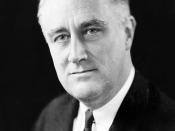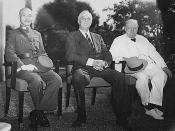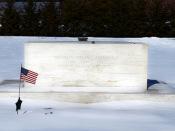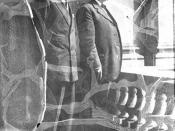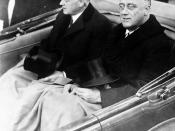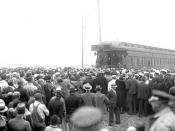Roosevelt's responsibility for his election victory in 1932 could be accounted for by the following:
Firstly, Roosevelt had widespread public respect for his work as governor by 1932. This was because of a number of things. Not withstanding his obtaining tax relief for farmers; establishing the first system of relief for the unemployed in New York after the Great Depression of October 1929; bringing tighter control of public utilities; and creating a power authority to develop the water power of the St. Lawrence River. He also modernized laws within the state prison system and established old-age pensions. A broad conservation and reforestation program also went into effect. Thus, his popularity was further solidified by his reelection in 1930 by about 725,000 votes, a record for the state at that time.
Secondly, Roosevelt visited 38 states to show the voters that he was physically able to be President. Such a journey would have been difficult if not impossible for anyone in his condition.
Voters were therefore reassured of his physical health, convinced of his determination for overcoming his disease (thus believing in his fighting spirit) and also touched by his earnestness.
Thirdly, Roosevelt's hopes inspired the people for the future. In a nationwide radio address, Roosevelt outlined a program to meet the economic problems of the nation.
"Such a program,"he said, "had to be built for the average American, whom he called the "forgotten man". He called it a "new deal" which (he claimed) would lead the nation out of the Depression. He also said he would set up economic safeguards to prevent future depressions. Jobs would be offered for those 14 million unemployed people. Further savings and property would be protected. American agriculture would be back on its feet, he claimed.
Not only that, Roosevelt promised what the nation needed desperately. He promised to provide relief for the unemployed, old, sick, and elderly; to help the farmers, and to balance the budget. He also said he would end Prohibition and thereby stop the rise in gangster-originated killing and illegal trafficking, not to mention rising rates of prostitution and boot-legging.
In addition to that, Roosevelt promised real, immediate action. People were more partial to action than just talk, as Hoover's reputation led them to believe.
Furthermore, Roosevelt was an excellent, confident speaker. Thus, with a clever wit and a reputation for putting the crowds at ease, he outdid Hoover.
